General
Universities need to generate Entrepreneurs & Innovators – Ramathan Ggoobi, Permanent Secretary & Secretary to the Treasury
Published
4 years agoon
By
Mak Editor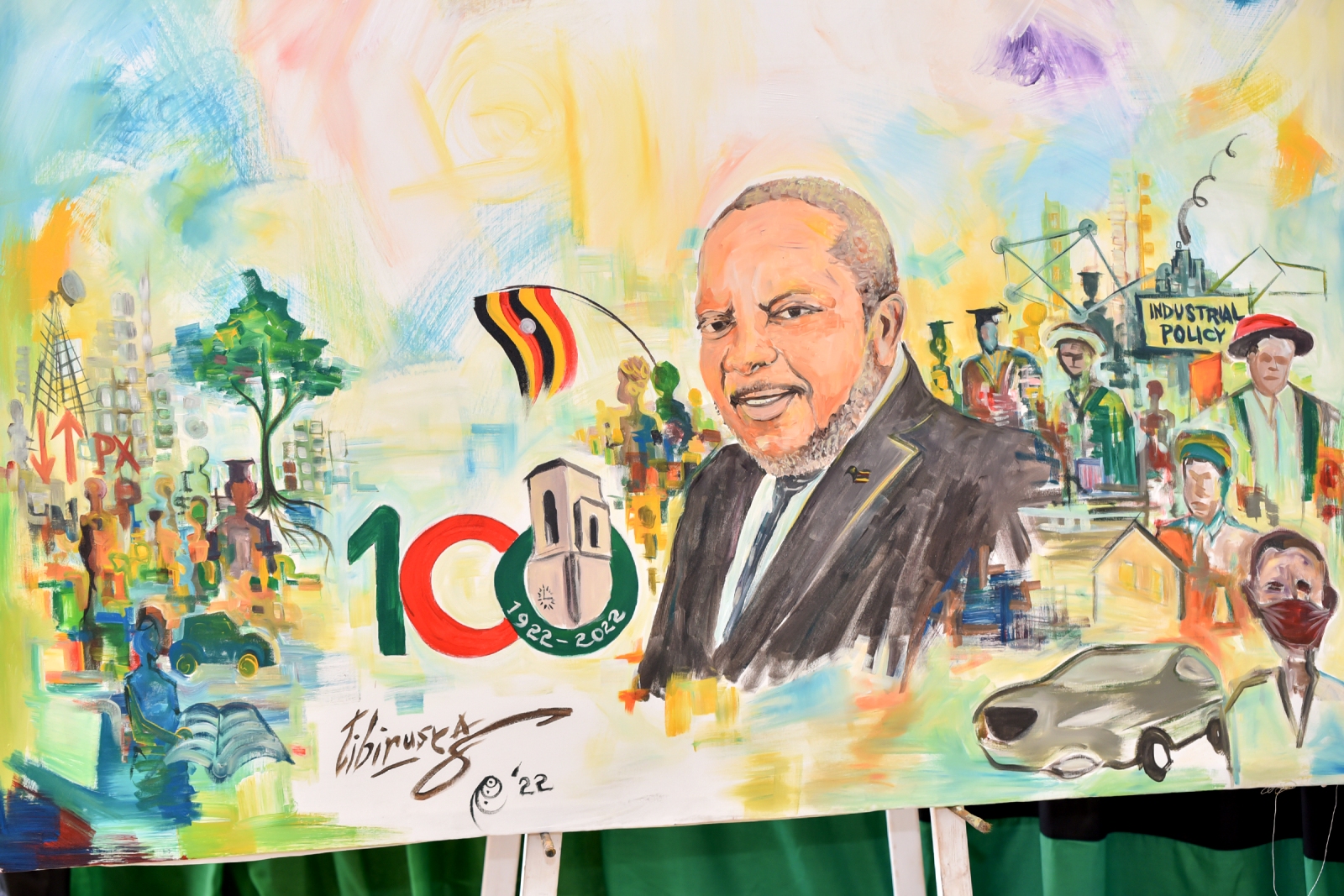
By Our Writer
Ggoobi said a young Mutebile was conscious enough to comprehend Amin’s economic distortions and human rights violations, and risked to oppose them. Yet, like many budding economists of the time, Mutebile started as a socialist. He quickly mutated into a liberal thinker and went on to help Uganda to get rid of economic distortions.
Universities should also play a key role in economic and social planning. Enterprise incubators and start-up support should be scaled to boost local job creation and competitiveness of small businesses, Ramathan Ggoobi the Permanent Secretary and Secretary to the Treasury in the Ministry of Finance, Planning and Economic Development Uganda has said.
Ggoobi also said as hosts for the country’s young generations, universities should think about practical ways of averting the growing boomerang generation—young adults who return to their parents’ home after university because they’ve failed to live on their own.
Delivering his keynote speech at the inaugural Tumusiime Mutebile Memorial Lecture under the theme, ‘Economic recovery and resilience in a post Covid-19 world-The role of Higher Institutions,’ Ggoobi said the key to economic recovery now is in the ability of our university to generate the kind of human resource that ultimately will translate into entrepreneurship and innovations
“Apart from promoting greater productivity and work efficiency, education is the primary opportunity equalizer. Probably the key to economic recovery is in the ability of our universities to generate the kind of human resource that ultimately will translate into entrepreneurship and innovations.
Ggoobi said during the pandemic Makerere set up a University Scientific Advisory Committee which was key in advising the Government.
“Universities need to relax a bit on the requirements – both academic and financial – to take on more students and reduce the dropout rate, one of the effects of the pandemic. Please do everything possible not to leave any student behind, particularly those who belong to the most vulnerable socioeconomic backgrounds. Remember, families are going through a very difficult time. So, develop timely, student-centric responses,” Ggoobi said.
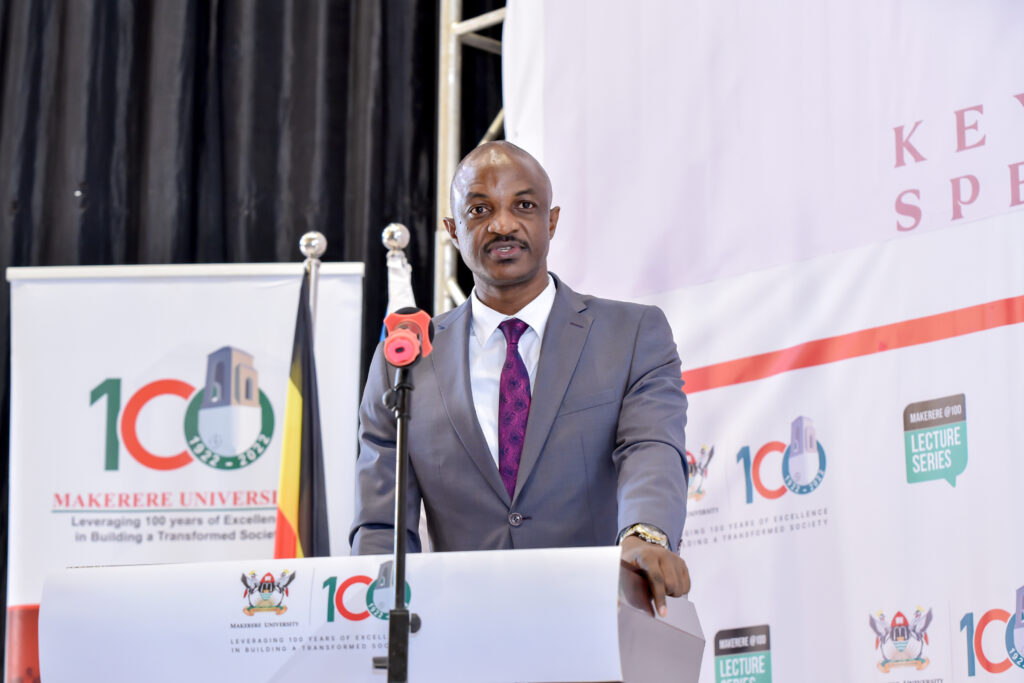
Ggoobi said as government, they were committed to continue enhancing funding for universities to support the transformation of higher education in the face of tectonic, long-term shifts in demographics, technology and competition. We shall invest more in online, hybrid and competency-based learning, improved infrastructure, student sponsorship, and most importantly research and innovation.
Ggoobi said that it was an immense pleasure to return to this intellectual powerhouse to honor one of the greatest economists and reformers of our time, and also to talk about economic recovery efforts.
“On behalf of the Ministry of Finance, Planning and Economic Development, and specifically the hundreds of fellow alumni of this great institution working in the Ministry, I am delighted to congratulate Makerere upon reaching 100 years of Building for the Future,” Ggoobi said.
Ggoobi said Makerere University was one of the world’s most prestigious universities. “Its alumni include world leaders, top notch intellectuals, leading business executives, and many other impactful human beings, both living and dead. I thank you for inviting me and enabling me to return to Makerere for the first time as the Secretary to the Treasury of the Republic of Uganda. I started my journey of training as an economist here,” he added.
Ggoobi noted that there were a number of things he was scheduled to do, “but I honestly can’t think of one that would make me happier and proud, than one for the promotion of economics. Until recently, my life’s work (my teaching, my research, my public writing, my community work, and even my twitter and Facebook posts) has been all about trying to demonstrate to fellow Ugandans what I learnt while in the gates of Makerere – that economics is not common sense per se.
Ggoobi said the Covid-19 pandemic had greatly affected the country and the entire world.
“In any case the entire world has been a laboratory and us all the specimens for its torment. From the anguish of losing our loved ones (a world total of 6.23 million souls – and still counting; of whom 3,597 were Ugandans) to a disrupted recovery and higher inflation, the pandemic has plagued the human race at unprecedented scale,”
Ggoobi noted that at its peak the global economic growth declined to minus 3.1 percent in 2020, from 2.9 percent in 2019. “In Uganda’s case, economic activity was cut by more than half. The services sector was most affected, in particular education, transport, hospitality and entertainment activities. The size of the labour force declined with many workers moving from modern and semi-modern sectors into subsistence agriculture.”
He also said the share of working persons in subsistence agriculture increased from 41% to 52% before and after the outbreak of the pandemic. “As we talk now, 6.8 million people (housed in 3.5 million homes) are in subsistence. We have also experienced revenue shortfalls in the past two years yet expenditure needs increased to finance the fight against Covid-19, enforcement of Covid-19 SOPs to keep Ugandans alive.”
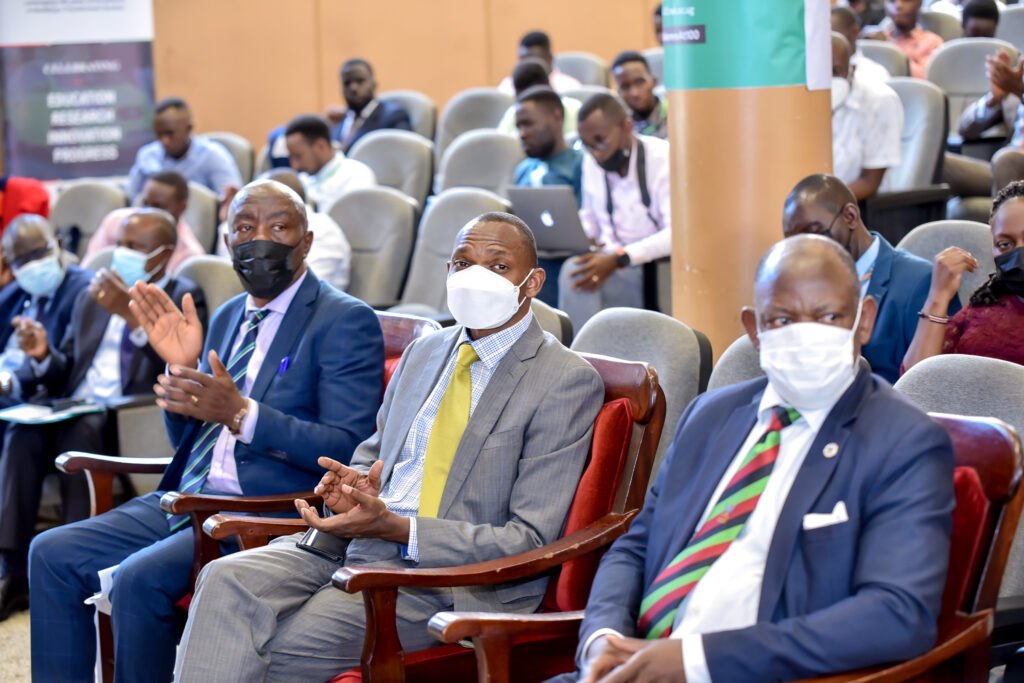
On commodity prices, Ggoobi said, “Economists know that it takes time for external shock to manifest themselves. In this case, they have started with prices of essential items, particularly laundry bar soap, fuel, cooking oil, building materials like cement and steel, some food items, and education services.”
He admitted that these had significantly increased in recent months. “As a result, inflation has risen to 3.7% in March 2022. The causes are largely external and supply-side related, key of which is the effect of Covid-19 restrictions which disrupted supply-chains worldwide leading to higher transport costs, shortage of shipping containers, shortage of raw materials, and higher fuel prices. This cocktail has curtailed smooth manufacturing/production and movement of goods and services, leading to increased commodity prices.”
He also attributed the increase in prices to the full opening of economies globally and the Russia-Ukraine war “After Covid had lessened, it led to a swift rise in aggregate demand for a number of goods and services such as fuel, transport, education etc. This has further increased prices. Since crises are like taxis; another one is often the way as one leaves the stage, the Russia-Ukraine conflict emerged as Covid left the stage and has further disrupted supply of goods such as oil, wheat, maize, and sunflower oil, as well as raw materials. The two countries are major producers and exporters of these commodities.
On what the Government was doing, Ggoobi said the causes of the current spike in prices were as a result of; Supply related; External; and Global. “Government policy response, therefore, must focus on addressing the supply constraints most of which are external and affecting the entire world. Anything else implemented would be a wrong medicine to a known ailment.”
He outlined some of the measures being undertaken by the Government to include; “Ensuring that we maintain a competitive environment to support a continuous supply of the goods and services whose stream is currently constrained – that is, fuel, soap, cooking oil, cement, steel, etc.- and avoid creating more shortages. We cannot afford to make demand outstrip supply. Most of the things some people want us to do are good common sense but very bad economics.”
Ggoobi also noted that they were supporting farmers to grow more food to ensure we do not suffer food shortages since food is the main driver of Uganda’s inflation.
“We are also facilitating more exports to take advantage of the shocks, and earn more foreign exchange to pay for the now expensive imports.
On what Mutebile would have done had he still been around, Ggoobi noted Mutebile was the grandfather of the economy we have today.
“Mutebile liberated Uganda from the ‘control model’—the practice of using administrative controls to keep the prices low and revaluing the shilling to make imports cheap. Beginning in 1966 the State of Uganda had assumed a lead in all the major economic activities. The leaders then and the people they led thought this was the best way of ensuring making the economy work for everyone,” Ggoobi said.
He said in 1969, in the bid to enable indigenous Ugandans to “have a say in the economic affairs of their country,” which at the time was dominated by Asians and British immigrants, and “for the realization of the real meaning of Independence”, President Apollo Obote announced a “Move to the Left”, culminating into the infamous 1970 Common Man’s Charter.
“This was the beginning of the control model in Uganda. When Idi Amin took power in 1971, economics was replaced by flawed common sense. As we heard in the numerous eulogies by his contemporaries, Prof Mutebile took the risk to remind the brash and unapprised Amin how economics works, and paid a huge price. Yet many Ugandans then considered him a nationalist.”
Ggoobi noted that even today, many Ugandans silently support Amin’s expulsion and expropriation of Asian property, price and foreign exchange controls and many other economic distortions.
“Generations of my students, none of whom was born by 1972 when Amin executed the economic war, as well as various groups of people I have taught Uganda’s economic history during my, often expressed support and silent admiration of Amin’s ‘nationalist credentials’”.
Ggoobi said a young Mutebile was conscious enough to comprehend Amin’s economic distortions and human rights violations, and risked to oppose them. Yet, like many budding economists of the time, Mutebile started as a socialist. He quickly mutated into a liberal thinker and went on to help Uganda to get rid of economic distortions.
He outlined some of the economic distortions Mutebile helped Uganda get rid of;
“First, Mutebile helped this country to get rid of price control. It resulted in an emergency of black markets (magendo) involving hoarding of basic groceries and other essential commodities.”
He also noted that Mutebile kicked out smuggling in Uganda. “Due to economic mismanagement, the past governments were unable to collect enough tax revenue to finance government expenditures. To deal with this challenge, the governments resorted to levying exorbitant import tariffs to raise revenue. The high tariffs forced traders to engage in smuggling,” Ggoobi said.
He further noted that Mutebile, “helped Uganda to stop printing money to finance budget deficits. The Bank of Uganda had been turned into a printing press for money. Consequently, inflation had galloped into triple digits.
Mutebile also saved Uganda from black markets. “These used to emerge as a result of fixed exchange rates. For example, the official exchange rate in 1986 was fixed at sh14 and sh50 per US dollar for essential and non-essential imports respectively. Fixing of the exchange rate led to shortage of foreign exchange and emergence of black markets (the Kibanda market) for foreign currencies. International trade was severely affected leading to a shortage of imported goods and services.
Ggoobi also said, Mutebile helped Uganda to restore fiscal discipline. “He re-established the discipline of government, maintaining a fiscal position that is consistent with macroeconomic stability and sustained economic growth. Government avoided excessive borrowing and debt accumulation; committed more spending of the national budget on productive activities in the economy.
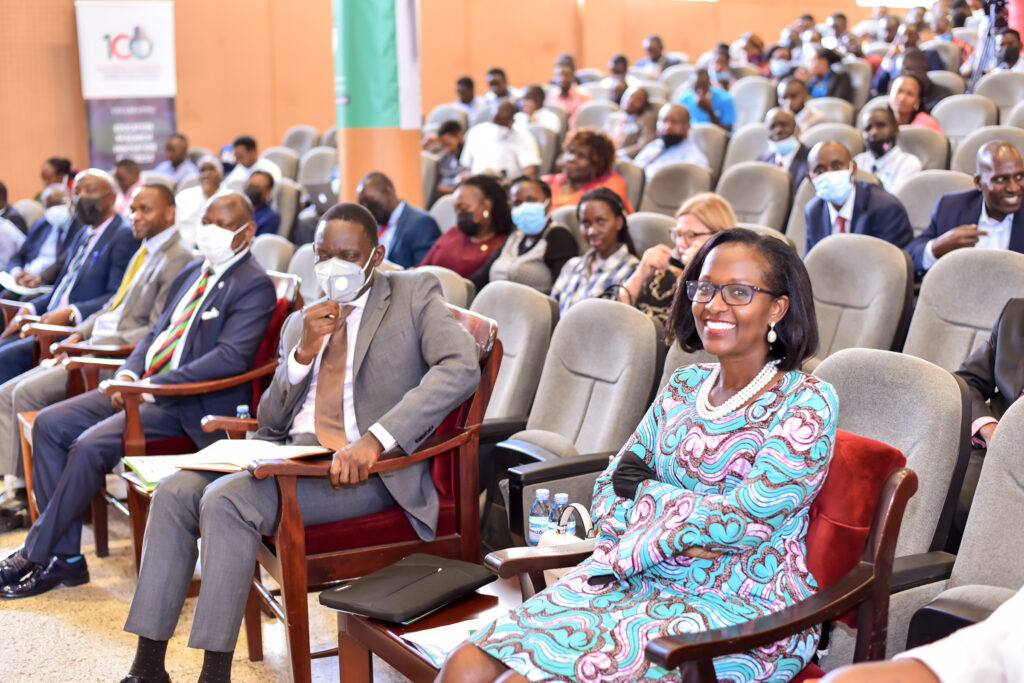
“It was Mutebile who masterminded the merger of the Ministry of Finance (MoF) with the Ministry of Planning and Economic Development (MoPED) in March 1992. This improved coordination of macroeconomic management. Within one fiscal year, inflation reduced from 54.5% in 1992/93 to 5.1% in 1993/94,” Ggoobi said.
Ggoobi further said that as pioneer PS/ST, Mutebile implemented three basic principles: Prudence by ensuring that expenditure by government was in line with revenue, and limiting borrowing strictly to necessary needs; Sustainability insisting no expenditure commitments that couldn’t be sustained over the medium and long term; and Consistency: all expenditures in line with the government’s long-term goal of building an independent, integrated and self-sustaining economy.
Ggoobi said Mutebile jealously defended the independence and authority of BoU over monetary policy (BoU Act); regulation and supervision of banks (FIA); and performance of its functions without subjecting it to the direction or control of any person or authority (Constitution). This transformed the bank into a credible institution with the prime objective of maintaining price stability.
“Mutebile led the crusade of private sector development to reduce government and its inefficiencies in doing business. All these reforms enabled Uganda recover and sustain growth at an impressive average annual rate of over 6.5% per year; maintained single-digit inflation averaging 5% for much of the period Mutebile was in charge at the Treasury and BoU; and facilitated poverty reduction from 56% in 1992 to 19.7% in 2014.
He also talked about the unfinished business Mutebile would want us to address saying the Government was now focused on the unfinished business not only to maintain Mutebile’s legacy but to propel Uganda to the level he and all of us want it to get to.
“In the medium term our efforts and resources will be concentrated on addressing the following: A large subsistence economy that has crippled household incomes and the purchasing power of the population; High unemployment and underemployment of the young people; High cost of credit, electricity and transport, which lower competitiveness of Ugandan products in regional and international markets; Low investment in scientific research and development to inform innovation and policy.
He also noted that they would focus on; Low level of industrialization; Land ownership and security, land use and land fragmentation; High levels of corruption in government and private sector; Limited export markets; and Quality of healthcare and education services.
The Tumusiime Mutebile Public Lecture will be an annual event which will serve as an intellectual rallying point for scholars, students and the general public by drawing eminent scholars and government representatives from across Africa and the globe in intellectual conversation and discourse that will proffer solutions to crucial issues in building a recovering and resilient economy in Uganda.
You may like
-


Olivia Nakisita and the Quiet Urgency of Adolescent Refugee Health
-
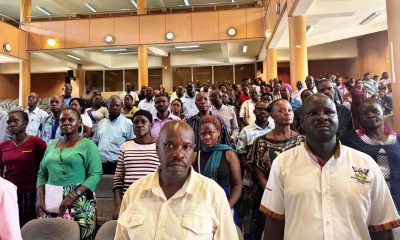

Support Staff Trained to Promote Safety of Students and Stakeholders
-
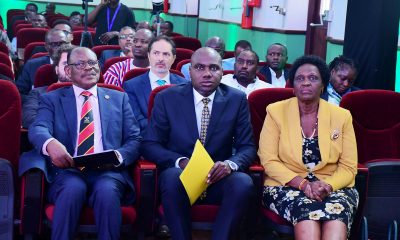

First African Symposium underscores the role of the Centre of Excellence for Africa Climate-Sensitive Macroeconomic Modelling
-
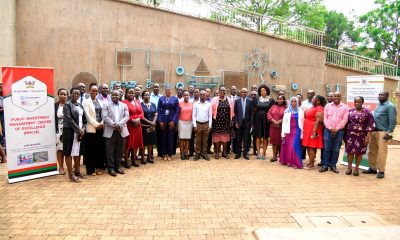

Makerere Hosts Second Cohort of MoKCC&MA Procurement Officers for E&S Safeguards Training
-
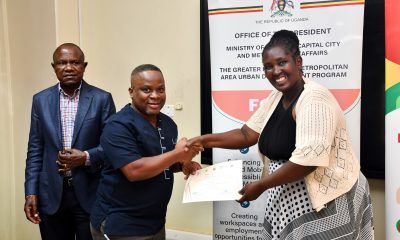

PIM Centre Awards Certificates to MoKCC&MA Officers after Safeguards Training
-
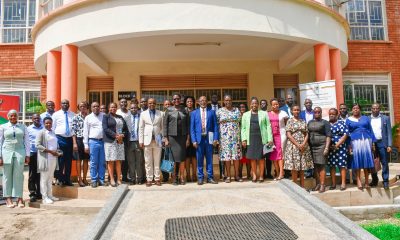

VC Opens Training for MoKCC Officials on Safeguards in Procurement

The 76th Graduation Ceremony of Makerere University will be held from Tuesday 24th to Friday 27th February, 2026. A total of 213 PhDs (87 female, 126 male), 2,503 Masters (1,087 female, 1,416 male), 206 Postgraduate Diplomas (80 female, 126 male), 6,343 Undergraduate Degrees (2,999 female, 3,344 male), and 30 Undergraduate Diplomas (9 female, 21 male) will be graduating from all the Colleges.
Ms. Sarah Aloyo and Ms. Nakato Dorothy both students of the Bachelor of Procurement and Supply Chain Management emerged as the best in the Humanities and Best Overall students with a CGPA of 4.93. Mr. Ssewalu Abdul, a Bachelor of Leisure and Hospitality Management student emerged second best in the Humanities with a CGPA 4.90. Ms. Esther Ziribaggwa emerged as the best student in the Sciences with a CGPA of 4.77 in the Bachelor of Agricultural and Rural Innovation, while Mr. Simon Mungudit emerged second best in the Sciences with a CGPA of 4.76 in the Bachelor of Science in Petroleum Geoscience and Production.
Commencement Speakers
- Day 1 – Prof. Nicholas Ozor, the Executive Director of the African Technology Policy Studies Network, Nairobi, Kenya
- Day 2 – Prof. Dr. Maggie Kigozi, Chairperson Makerere University Endowment Fund Board
- Day 3 – Dr. Patricia Adongo Ojangole, Managing Director, Uganda Development Bank Limited
- Day 4 – Ms. Reeta Roy, Former President & Chief Executive Officer, Mastercard Foundation
The 76th Graduation Ceremony will be held at the Freedom Square following the schedule below:
Tuesday, 24th February, 2026
College of Agricultural and Environmental Sciences (CAES)
College of Computing and Information Sciences (CoCIS)
College of Education and External Studies (CEES)
School of Law (SoL)
Livestream Link for Day 1: https://youtube.com/live/wVGPA0FJ9pU
Wednesday, 25th February, 2026
College of Health Sciences (CHS)
College of Natural Sciences (CoNAS)
College of Veterinary Medicine, Animal Resources and Bio-security (CoVAB)
School of Public Health (SPH)
Thursday, 26th February, 2026
Makerere University Business School (MUBS)
College of Business and Management Sciences (CoBAMS)
Friday, 27th February, 2026
College of Engineering, Design, Art and Technology (CEDAT)
College of Humanities and Social Sciences (CHUSS)
Institute of Gender and Development Studies (IGDS)
Makerere Institute of Social Research (MISR)
General
Mak Selected to Host Alliance for African Partnership Africa Office
Published
1 day agoon
February 23, 2026
Makerere University has been selected to host the Africa Office of the Alliance for African Partnership (AAP). The significant milestone that underscores Makerere’s role in fostering research, innovation, and global collaborations across the continent was announced at a meeting of the University’s Central Management with an AAP delegation on 23rd February 2026.
Makerere’s selection was based on the University’s robust commitment, alignment with the AAP’s Strategic Plan, and proven ability to manage consortium activities. The AAP, which was initiated by Michigan State University (MSU) in collaboration with Ten African Universities and agricultural policy research networks in 2016, targets critical challenges in education, youth empowerment, health and nutrition, agri-food systems, science and technology, water, energy, environment, and culture and society.
Addressing the delegation consisting of AAP Co-Directors from MSU, Dr. Jose Jackson-Malete and Dr. Amy Jamison, accompanied by newly-appointed Director of the AAP Africa Office, Dr. Racheal Ddungu Mugabi and Ms. Clare Cheromoi, the Vice Chancellor, Prof. Barnabas Nawangwe who appreciated the choice of Makerere to host the Africa Office said:
“One of the greatest challenges facing African universities is PhD training, particularly supervisory capacity. Through partnerships such as the Alliance for African Partnership we can leverage international expertise to strengthen supervision—whether through training supervisors or through joint supervision arrangements.”
Prof. Nawangwe equally applauded joint initiatives such as the Grant Writing and Publication project, which gave rise to the establishment of a Writing Centre that he said can be used to build capacity in AAP member universities with Makerere as the hub. Officially launched on 21st March 2023, the project is living up to its expectation of becoming a springboard for strong postdoctoral collaborative research for both institutions and other US universities.
Dr. Titus Awokuse, Vice Provost and Dean for International Studies and Programs at Michigan State University (MSU) who attended virtually, reiterated that Makerere’s selection reflects its long-standing commitment to advancing African higher education, research excellence, and meaningful global collaboration.
Reflecting on the origins of the Alliance for African Partnerships (AAP), Dr. Awokuse explained that nearly a decade ago, MSU initiated a transformative conversation in Atlanta centered on the question: How should we partner differently? From this dialogue emerged AAP—an Africa-centered consortium that now brings together 12 institutions across Africa and the United States.

He emphasized that AAP is grounded in equity, mutual benefit, shared leadership, and deep respect for African priorities and expertise. Since its founding, MSU has served as convener and key supporter, working with member institutions to strengthen research collaboration, promote faculty and student engagement, and address shared development priorities.
Dr. Awokuse underscored that AAP’s success is the result of collective vision and commitment, not the efforts of a single institution. He paid tribute to Lilongwe University of Agriculture and Natural Resources for hosting the Africa Office in its early years and acknowledged the foundational leadership of the inaugural Africa Office Director.
He described the launch of the Africa Office at Makerere University as a significant milestone that reinforces Africa-led leadership, strengthens regional collaboration, and enhances responsiveness to emerging opportunities. MSU, he affirmed, remains fully committed to AAP and to working closely with Makerere and all consortium partners to expand collaborative research, nurture the next generation of scholars, and advance Africa-led solutions to global challenges.
The newly-appointed AAP Africa Office Director, Dr. Racheal Ddungu Mugabi is a member of faculty in the Department of Development Studies, Institute of Gender and Development Studies. Her work on intersectional inequalities in Uganda and other Global South regions uniquely positions her to drive collaborative research and partnerships at the Africa Office.
Initially founded by ten African Universities and MSU, AAP now comprises eleven African members including; the African Network of Agricultural Policy Institutes (ANAPRI)-Zambia, Egerton University-Kenya, Lilongwe University of Agriculture and Natural Resources (LUANAR)-Malawi, Makerere University-Uganda, United States International University-Africa-Kenya, Universite Cheikh Anta Diop-Senegal, Universite Yambo Ouologuem de Bamako-Mali, University of Botswana-Botswana, University of Dar es Salaam-Tanzania, University of Nigeria, Nsukka-Nigeria, and the latest, University of Pretoria-South Africa.
These Universites collaborate under Focal Points to advance policy-relevant research and sustainable development. Makerere University’s Focal Point is Prof. Robert Wamala, Director of Research, Innovations and Partnerships (DRIP).
Addressing the University Management, Dr. Jackson-Malete outlined the African Futures Research Leadership Program, which nurtures early career scholars through mentorship and skill-building as one of AAP’s flagship programs. She noted that the Program that prioritizes female participants or men committed to promoting women in higher education has for the first time during its fifth cohort admitted the first male, Dr. Alfadaniels Mabingo from the Department of Performing Arts and Film, Makerere University.
The AAP Africa Office at Makerere will coordinate activities, boost research collaboration, mobilize resources, and enhance global engagements for socio-economic transformation. This aligns with Makerere‘s broader goals of leveraging international expertise to build resilient institutions.
View more photos from the event: https://flic.kr/s/aHBqjCLjoA
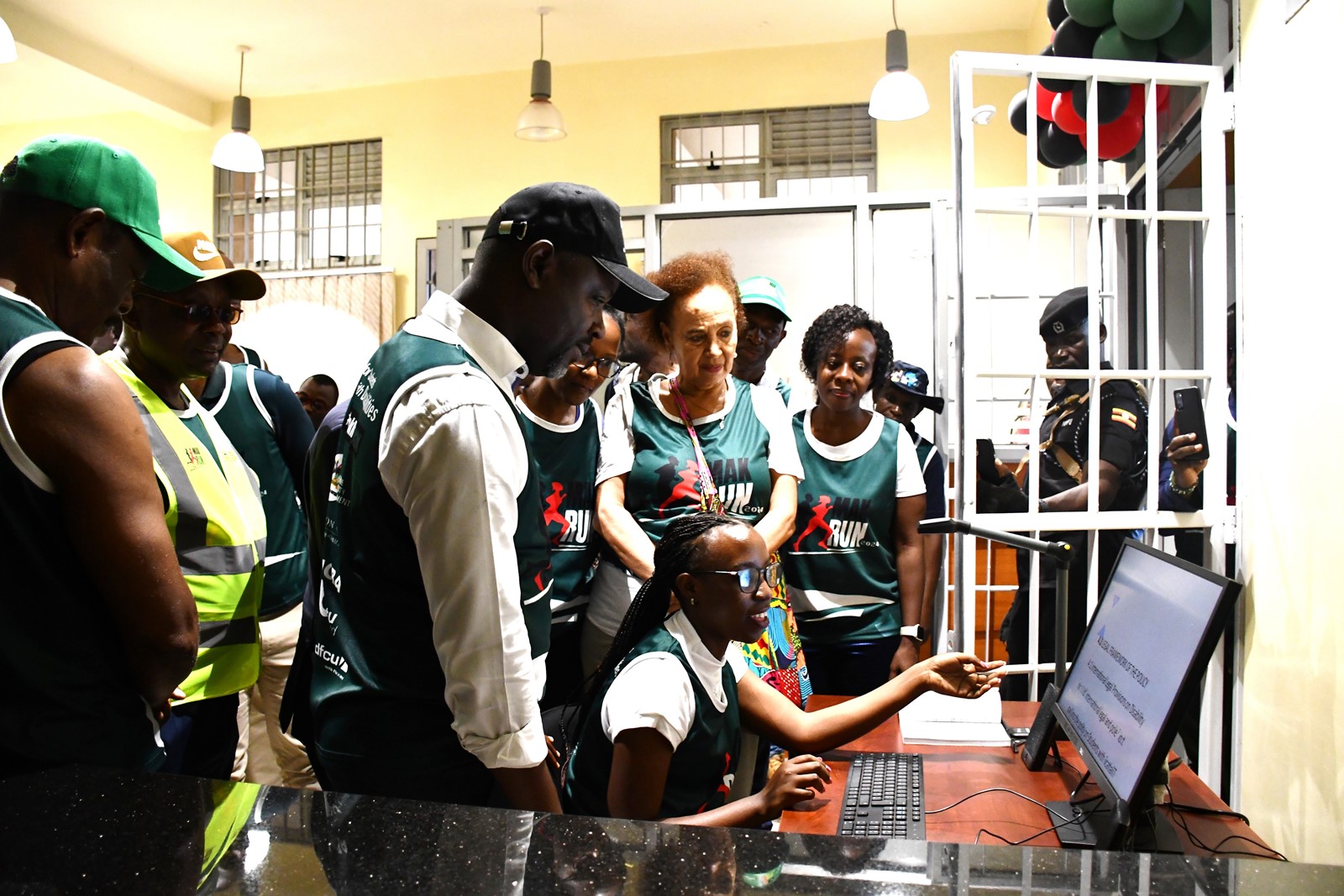
Students with disabilities at Makerere University have been requested to stop seeking for special attention and instead look for solutions and opportunities for personal growth.
This was during a mental wellness, inclusion and safeguarding session organized by the Dean of Students office and the Mastercard Foundation Scholars Program at Makerere University.
Addressing students on mental health and disability inclusion, Mr. Marvin Ggaliwango, a lecturer at the College of Computing and Information Sciences (CoCIS), noted that if the students stop complaining, they will become empowered to take charge of their own development, build resilience and engage confidently in both academic and social environments.
“Turn your lived experiences into tools for innovation. Stop complaining and start creating solutions for yourselves. You are the one living this life, and that gives you the authority to be an expert. When you develop a solution, it doesn’t just benefit you, it helps others too, by removing barriers,” Mr. Marvin Ggaliwango, said.
He encouraged students to see themselves not as victims of circumstance, but as active participants and co-creators of the inclusive environment they wish to experience.
“Learn how to communicate effectively and humbly. If you have a problem, express yourself clearly. Do not isolate yourself or feel resentful. You are not defined by disability, you may face disadvantages, but you still have ability,” he encouraged.
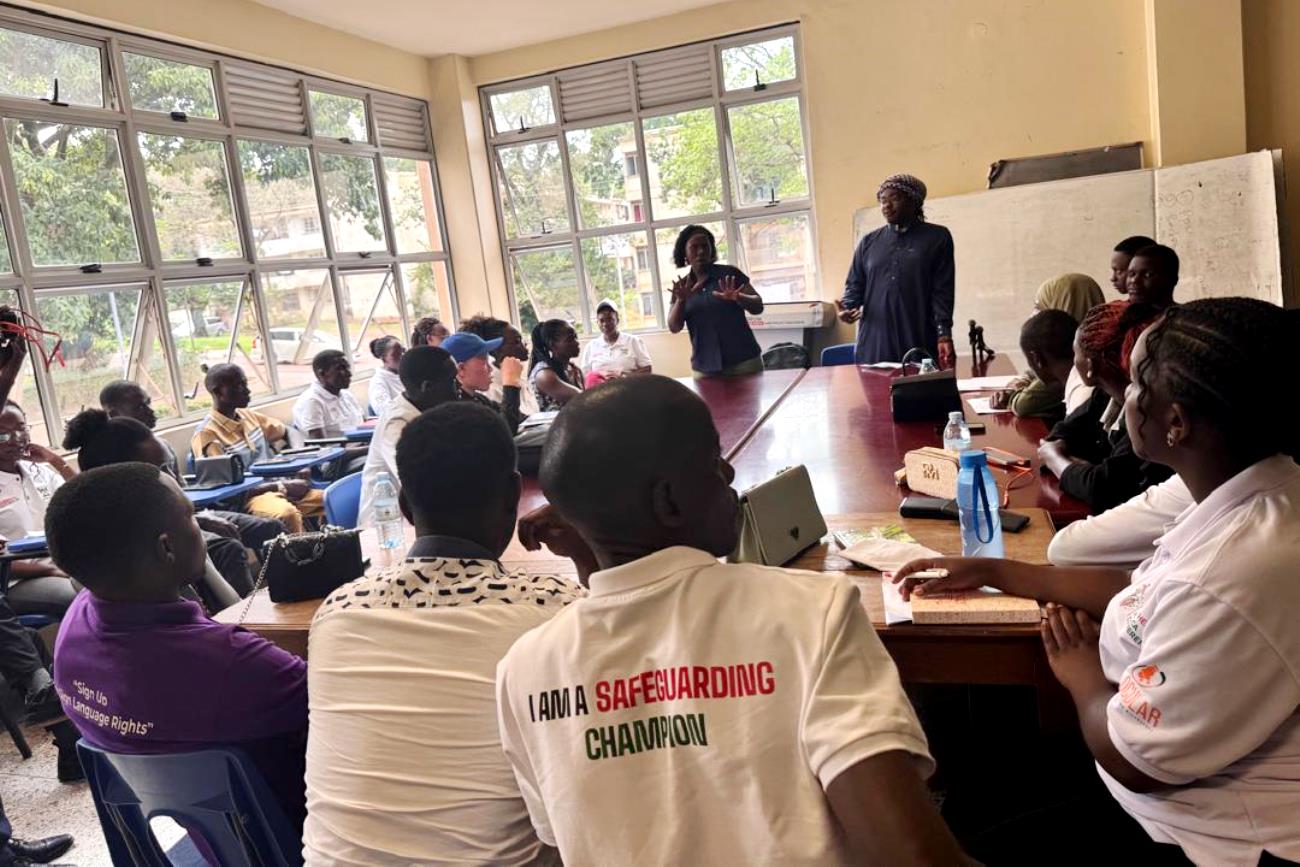
Throughout the session, students listened attentively as he emphasized the importance of self-awareness and personal responsibility, urging them to understand their strengths, acknowledge their limitations and take deliberate steps toward personal growth while contributing positively to the University community.
“We must enhance and ensure that our mental health is number one. Always choose yourself first. Choose what makes you happy and protect your peace. If you are at peace with yourself, your academics will improve. There is a strong link between mental wellness and academic success,” Mr. Ggaliwango, noted.
In his speech, Mr. Musa Mwambu, the Disability Inclusion Advisor at Light for the World Uganda, called upon the students with disabilities to enhance and ensure that their mental health is prioritized.
“As students living with disabilities, sometimes you over expect, because you have a disability you should be given, listened to and when people do not listen to you, you attribute it to your disability, get it from me, even those without disabilities are not listened too. Things are not happening to you because of your disability it is because of the world we live in. Everything that happens to you can happen to others,” Mr Mwambu, noted.
“Have fun with your life. Make yourself happy and be smart. Present yourself in public confidently wherever you go. The way you carry yourself can improve your mental health and how others perceive you,” Mr. Mwambu said.
He reminded the students that gaining admission to Makerere is itself a milestone.
“There are many people without disabilities who have never stepped at Makerere University. Find something that empowers you and hold on to it. You may have a physical impairment, but if you are brilliant in class, you can lead discussions and inspire others,” he added.

During the session, Dr. Rodney Rugyema, the Acting Principal Warden, welcomed the students back from the long holiday. He assured them that the University is committed to their safety and well-being while on campus.
Dr. Rugyema emphasized that the University has systems in place to protect students, both physically and psychologically and encouraged them to report any concerns promptly.
“When you are at the University, you are not on your own, we are always here for you. For us to engage you on mental wellness and inclusion, we want you to be in the right state of mind, whole and complete,” Dr Rugyema, said.
He added: “We are here to empower you and we are calling upon you not be a risk for yourself and always be able to detect risks that are likely to affect your mental health and works towards avoiding them and reporting them to ensure that the University manages them before they escalate into real harm whose impact is more serious than you can think,”
During the session, Ms. Diane Nabikolo Osiru highlighted the University’s broader commitment to safeguarding.
Safeguarding at Makerere University refers to measures put in place to promote safety and wellness of all students, staffs and other stakeholders.
“At Makerere University, safety is not a luxury for few. but it is a right for every student. As the semesters begins, we are urging you to learn how to identify signs of harm or abuses and report them to the appropriate safeguarding contact points,” Ms Nabikolo, said.
For support in case of any harm or abuse, International and Refugee Students, can access support through the Advancement and International Office, while Students with Disabilities, can utilize the Disability Support Center. Those with personal and emotional challenges, can visit the Counselling and Guidance Centre.
In his speech, Dr Joab Agaba, a Lecturer in the College of Computing and Information Sciences, guided students how to report risks and incidences to the MakSafeSpace, the e-reporting platform complimenting the other University traditional reporting channels.
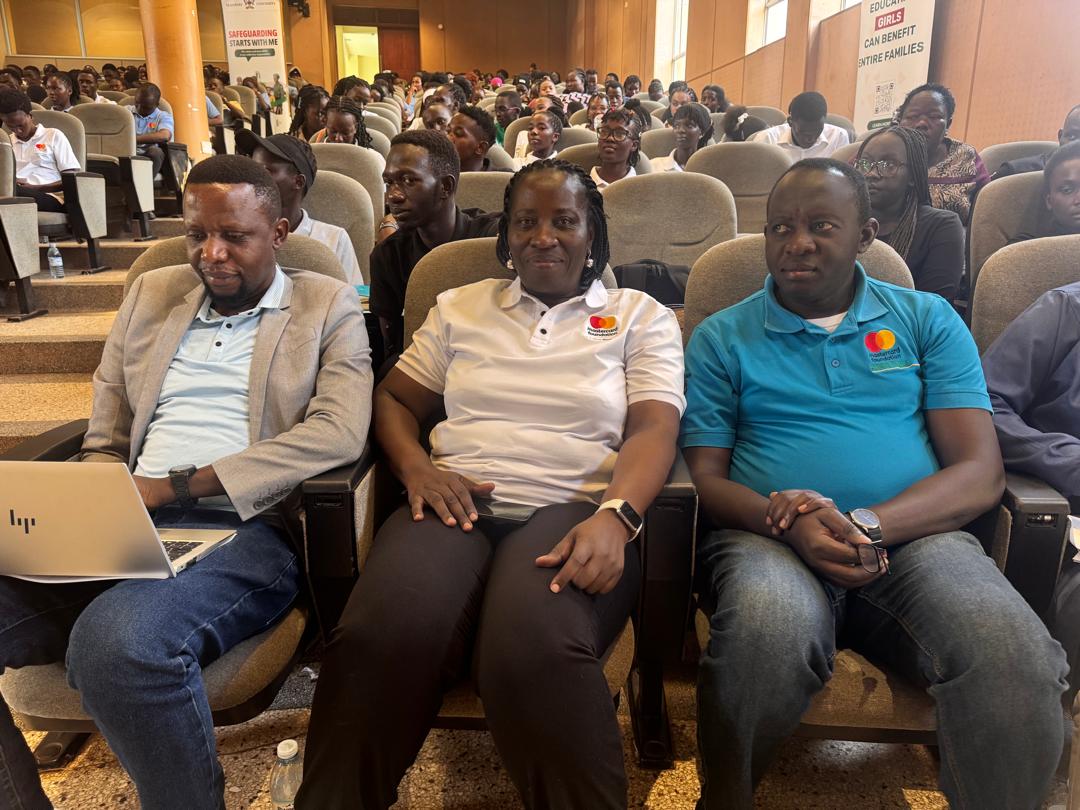
Mr. Henry Nsubuga, the Manager of the Counselling and Guidance Center, shared practical strategies for coping with stress effectively including time management, setting realistic goals, seeking support from peers or counsellors.
Students speak out
Shanitah Nahamya, 2nd year student of the Bachelor of Adult and Community Education
“I have learned how to respectfully and appropriately engage with students with disabilities. In the past, I often felt pity when I encountered them, but now I understand that what they need is not pity, it is respect, support, and equal opportunity.”
Guo Dorothy Geri, 1st year student of the Bachelor of Commerce
“I have learnt how to use inclusive language. Before offering help to a student with a disability, I will first ask them, because not all the time do they need our help. You might think someone wants to be helped to cross the road, yet they are waiting for someone.”
Valentines Doris Aduka, 1st Year student of the Bachelor of Biomedical Science
“I have been calling students with disabilities special names, thinking it was kind. But I have learned that they do not want to be treated differently or labeled in a special way. What they value most is being treated like everyone else, with respect, dignity, and fairness.”
Trending
-

 Humanities & Social Sciences1 day ago
Humanities & Social Sciences1 day agoMeet Najjuka Whitney, The Girl Who Missed Law and Found Her Voice
-

 Health6 days ago
Health6 days agoUganda has until 2030 to end Open Defecation as Ntaro’s PhD Examines Kabale’s Progress
-

 Agriculture & Environment4 days ago
Agriculture & Environment4 days agoUganda Martyrs Namugongo Students Turn Organic Waste into Soap in an Innovative School Project on Sustainable Waste Management
-

 General6 days ago
General6 days agoMastercard Foundation Scholars embrace and honour their rich cultural diversity
-

 Health2 weeks ago
Health2 weeks agoCall for Applications: Short Course in Molecular Diagnostics March 2026
